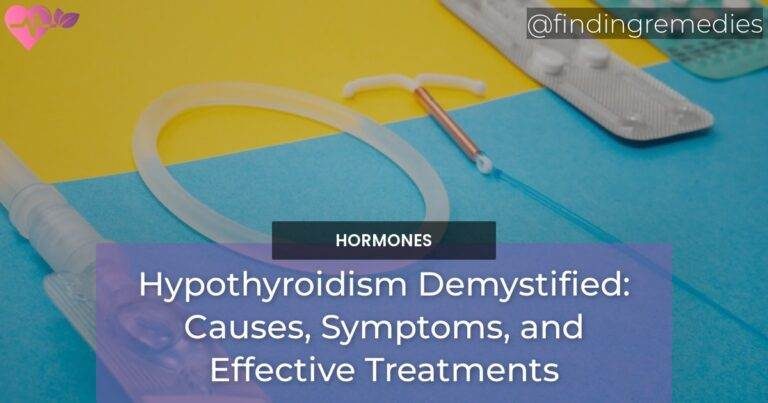Hypothyroidism is a health condition that occurs when the thyroid gland produces insufficient amounts of thyroid hormones. This condition affects millions of people worldwide, and it is more common in women than men. Understanding hypothyroidism is essential to manage and treat the condition effectively. In this article, we will explore the causes, symptoms, diagnosis, and treatment options for hypothyroidism.
Table of Contents
What is Hypothyroidism?
The thyroid gland is a butterfly-shaped gland located in the neck, just below the Adam’s apple. It produces two hormones: triiodothyronine (T3) and thyroxine (T4), which are responsible for regulating the body’s metabolism. Hypothyroidism occurs when the thyroid gland does not produce enough of these hormones, leading to a slower metabolism.
The most common cause of hypothyroidism is an autoimmune disorder called Hashimoto’s thyroiditis, which causes the immune system to attack the thyroid gland. Other causes include thyroid surgery, radiation therapy, and certain medications.
The thyroid gland requires iodine to produce thyroid hormones. A deficiency in iodine can also cause hypothyroidism. However, this is rare in developed countries, where iodine is commonly added to table salt and other foods.
It is essential to maintain a healthy thyroid gland to ensure the proper functioning of the body. Hypothyroidism can lead to weight gain, fatigue, depression, constipation, dry skin, hair loss, joint pain, heart disease, and myxedema (a severe form of hypothyroidism).
ALSO READ
Symptoms of Hypothyroidism
The symptoms of hypothyroidism can vary depending on the severity of the condition. Some common symptoms include:
- Weight gain
- Fatigue
- Depression
- Constipation
- Dry skin
- Hair loss
- Joint pain
- Heart disease
- Myxedema
It is essential to recognize the symptoms of hypothyroidism early to prevent complications. The symptoms may develop slowly over time, making it easy to overlook them. If you experience any of the symptoms mentioned above, consult your doctor.
The symptoms of hypothyroidism can also differ between men, women, and children. In men, the symptoms may include erectile dysfunction, decreased libido, and muscle weakness. In women, the symptoms may include heavy menstrual periods, fertility problems, and pregnancy complications. In children, the symptoms may include delayed growth and development and poor mental development.
Diagnosing Hypothyroidism
Diagnosing hypothyroidism involves a series of tests to measure the levels of thyroid hormones and thyroid-stimulating hormone (TSH) in the blood. TSH is a hormone produced by the pituitary gland that stimulates the thyroid gland to produce thyroid hormones. A high level of TSH in the blood indicates that the thyroid gland is not producing enough thyroid hormones.
If you suspect that you have hypothyroidism, consult your doctor. They will perform a physical examination, review your medical history, and order blood tests to check your thyroid hormone levels.
Interpreting the test results can be tricky, as the normal range for thyroid hormone levels varies depending on the laboratory. Your doctor will interpret the results and determine if you have hypothyroidism. If you have hypothyroidism, your doctor may refer you to an endocrinologist, a specialist in hormonal disorders.
Treating Hypothyroidism
The treatment of hypothyroidism involves replacing the missing thyroid hormones with medication. The most common medication used to treat hypothyroidism is levothyroxine, a synthetic form of thyroid hormone. It is essential to take the medication consistently and follow up with your doctor regularly to monitor your thyroid hormone levels.
In addition to medication, lifestyle changes can help manage hypothyroidism. Eating a well-balanced diet that includes iodine-rich foods such as seafood, dairy, and eggs, can help maintain a healthy thyroid gland. Exercise is also crucial in managing hypothyroidism, as it can help improve metabolism and prevent weight gain.
Alternative treatment options such as acupuncture and herbal supplements may also help manage hypothyroidism. However, it is essential to consult with your doctor before trying any alternative treatments.
Tips for Managing Hypothyroidism
Managing hypothyroidism involves making lifestyle changes to maintain a healthy thyroid gland. Here are some tips:
- Eat a well-balanced diet that includes iodine-rich foods
- Exercise regularly
- Manage stress levels
- Join a support group or find resources to help manage the condition
Conclusion
Hypothyroidism is a common health condition that can be effectively managed with the right treatment and lifestyle changes. Early diagnosis is crucial to prevent complications, and it is essential to work with your doctor to manage the condition effectively. By following the tips listed above, you can maintain a healthy thyroid gland and live a happy, healthy life.
RELATED ARTICLES:

